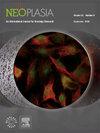The dual PI3K/mTOR inhibitor NVP-BEZ235 is a potent inhibitor of ATM- and DNA-PKCs-mediated DNA damage responses.
IF 7.7
2区 医学
Q1 ONCOLOGY
引用次数: 169
Abstract
Inhibitors of PI3K/Akt signaling are being actively developed for tumor therapy owing to the frequent mutational activation of the PI3K-Akt-mTORC1 pathway in many cancers, including glioblastomas (GBMs). NVP-BEZ235 is a novel and potent dual PI3K/mTOR inhibitor that is currently in phase 1/2 clinical trials for advanced solid tumors. Here, we show that NVP-BEZ235 also potently inhibits ATM and DNA-PKcs, the two major kinases responding to ionizing radiation (IR)-induced DNA double-strand breaks (DSBs). Consequently, NVP-BEZ235 blocks both nonhomologous end joining and homologous recombination DNA repair pathways resulting in significant attenuation of DSB repair. In addition, phosphorylation of ATMtargets and implementation of the G(2)/M cell cycle checkpoint are also attenuated by this drug. As a result, NVP-BEZ235 confers an extreme degree of radiosensitization and impairs DSB repair in a panel of GBM cell lines irrespective of their Akt activation status. NVP-BEZ235 also significantly impairs DSB repair in a mouse tumor model thereby validating the efficacy of this drug as a DNA repair inhibitor in vivo. Our results, showing that NVP-BEZ235 is a potent and novel inhibitor of ATM and DNA-PKcs, have important implications for the informed and rational design of clinical trials involving this drug and also reveal the potential utility of NVP-BEZ235 as an effective radiosensitizer for GBMs in the clinic.双PI3K/mTOR抑制剂NVP-BEZ235是ATM和DNA- pkcs介导的DNA损伤反应的有效抑制剂。
由于PI3K-Akt- mtorc1信号通路在包括胶质母细胞瘤(GBMs)在内的许多癌症中经常发生突变激活,PI3K/Akt信号通路抑制剂正被积极开发用于肿瘤治疗。NVP-BEZ235是一种新型有效的PI3K/mTOR双抑制剂,目前处于晚期实体瘤的1/2期临床试验中。在这里,我们发现NVP-BEZ235也能有效抑制ATM和DNA- pkcs,这两种主要的激酶对电离辐射(IR)诱导的DNA双链断裂(DSBs)有反应。因此,NVP-BEZ235阻断了非同源末端连接和同源重组DNA修复途径,导致DSB修复的显著衰减。此外,atm靶点的磷酸化和G(2)/M细胞周期检查点的实施也被这种药物减弱。结果表明,无论Akt激活状态如何,nlp - bez235在一组GBM细胞系中具有极端程度的放射致敏性,并损害DSB修复。在小鼠肿瘤模型中,NVP-BEZ235也显著损害DSB修复,从而验证了该药物作为DNA修复抑制剂在体内的功效。我们的研究结果表明,NVP-BEZ235是一种有效的新型ATM和DNA-PKcs抑制剂,这对涉及该药物的临床试验的知情和合理设计具有重要意义,同时也揭示了NVP-BEZ235在临床中作为GBMs有效放射增敏剂的潜在用途。
本文章由计算机程序翻译,如有差异,请以英文原文为准。
求助全文
约1分钟内获得全文
求助全文
来源期刊

Neoplasia
ONCOLOGY-
自引率
2.10%
发文量
82
期刊介绍:
Neoplasia publishes the results of novel investigations in all areas of oncology research. The title Neoplasia was chosen to convey the journal’s breadth, which encompasses the traditional disciplines of cancer research as well as emerging fields and interdisciplinary investigations. Neoplasia is interested in studies describing new molecular and genetic findings relating to the neoplastic phenotype and in laboratory and clinical studies demonstrating creative applications of advances in the basic sciences to risk assessment, prognostic indications, detection, diagnosis, and treatment. In addition to regular Research Reports, Neoplasia also publishes Reviews and Meeting Reports. Neoplasia is committed to ensuring a thorough, fair, and rapid review and publication schedule to further its mission of serving both the scientific and clinical communities by disseminating important data and ideas in cancer research.
 求助内容:
求助内容: 应助结果提醒方式:
应助结果提醒方式:


